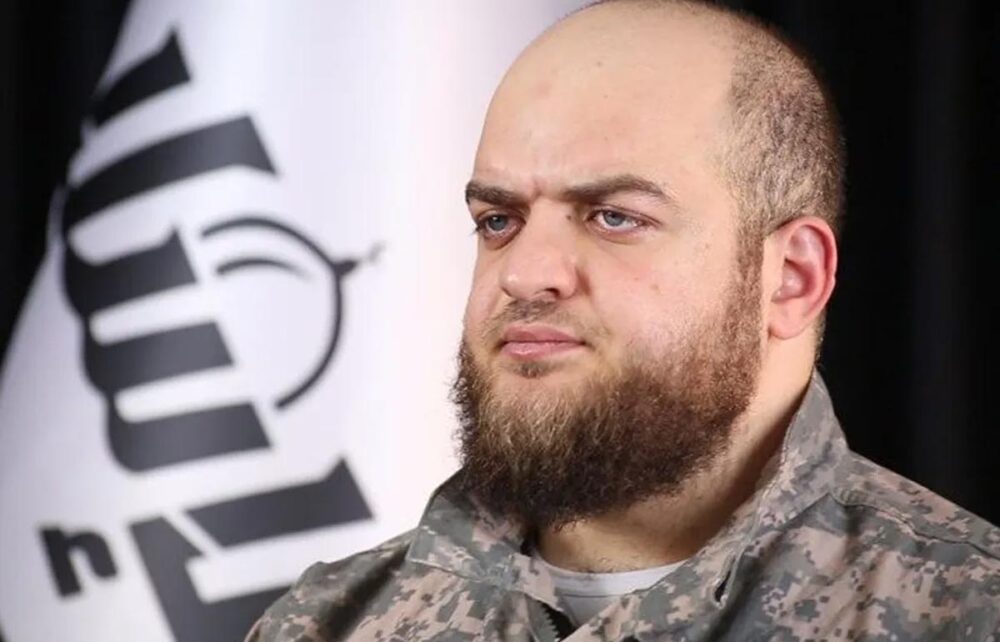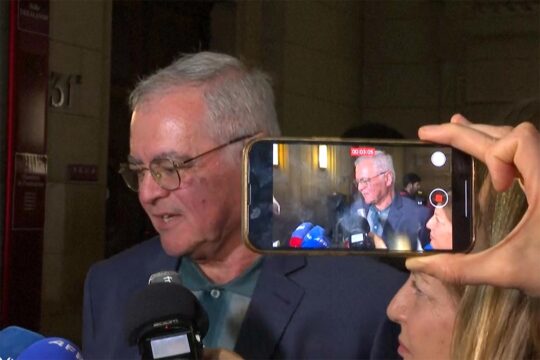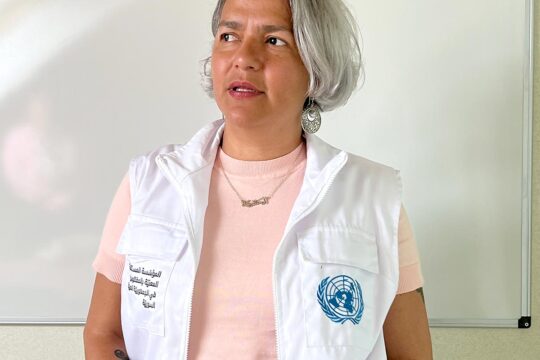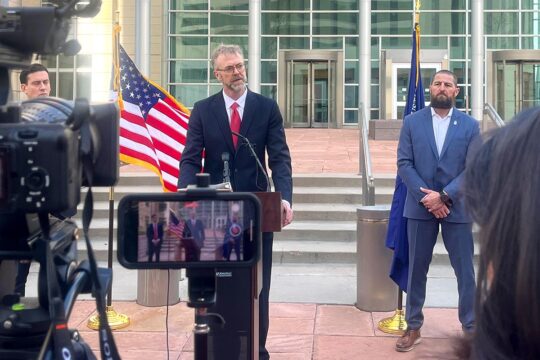“All the Syrians we ask say they would have preferred Majdi Nema to be tried in Syria,” concedes civil party lawyer Marc Bailly. “But they also say that is absolutely impossible at the moment.” Speaking a few days before the trial opening of this former spokesman for rebel group Jaysh al-Islam, Bailly said he does not want to ignore the context in which it is happening. The context is marked by former president Bashar al-Assad’s overthrow in December, and by the Syrian people’s expectations for transitional justice, which should eventually make it possible to try in Syria the crimes of the regime and rebel groups.
Because the situation is “extremely different” from the one when Majdi Nema was indicted, his lawyers Raphaël Kempf and Romain Ruiz believe “this trial should not be held in France”. “For justice to play a part in a democratic transition, it must be dispensed in the country, as close as possible to its citizens and victims,” explains Kempf. “I fear that by organizing this trial, the French justice system is confiscating the Syrian people’s own justice and legitimizing the possibility of foreign states doing justice in the place of Syrians.” However, as Bailly points out, it is hard to imagine that the new Syrian government, itself made up of former rebels, would be able to organize such a trial today. The civil parties’ lawyer also stresses the current “absence of an independent judicial authority”, as well as lack of guarantees on “respect for fundamental rights, including the rights of the defence”.
This debate is the backdrop to the start of the Nema trial, which will take place from April 29 to May 27 before the Paris Assize Court under the principle of universal jurisdiction. The French court will be examining Nema’s role and responsibility in crimes attributed to Jaysh al-Islam between 2013 and 2016, mainly in eastern Ghouta. Nema, who went by the name Islam Alloush, is suspected of complicity in war crimes for having helped to enlist minors, providing “assistance” in their recruitment and military training, and helping disseminate propaganda designed to “indoctrinate” them. He is also accused of “colluding” with the Jaysh al-Islam group “in his capacity as spokesman, intelligence officer and strategic advisor to the group’s leadership”, with a view to “preparing war crimes”.
“This is the second criminal trial concerning crimes committed in Syria,” the National Anti-Terrorism Prosecutor’s Office points out in a press release. Last May, a first trial took place of three senior Syrian regime officials, but it was held in absentia. This time, the accused will be present. Nema, who risks 20 years’ imprisonment, denies all the charges against him. He does not deny having acted as the group’s spokesman, but insists that his role within Jaysh al-Islam was limited.
Three organizations are acting as civil parties against Nema - the International Federation for Human Rights (FIDH), the Syrian Centre for Media and Freedom of Expression (SCM) and the Human Rights League (LDH) - as well as five individuals. The latter have through their lawyers requested anonymity, due to a climate of “threats and pressure” against them, which “has existed throughout the investigation”.
Nema’s role in Jaysh al-Islam
The trial’s first challenge, according to Bailly, is to win recognition that Jaysh al-Islam was “a group that committed war crimes, and a group that enlisted and conscripted minors”. In the midst of the Syrian revolution, the Salafist-based rebel group was formed in 2011 by Zahran Alloush; it was initially called Liwa al-Islam (“The Brigade of Islam”) and then became Jaysh al-Islam (“The Army of Islam”) in 2013. The group was officially disbanded a few weeks after the fall of Bashar al-Assad as part of an agreement reached in late 2024 between all the armed groups and Ahmed al-Charaa’s new government - allowing them to be integrated, in particular, into the Ministry of Defence.
Jaysh al-Islam is active mainly in eastern Ghouta, a region on the outskirts of Damascus known for having been besieged and bombarded by the al-Assad regime. It is also known for having been the scene of numerous acts of violence against civilians. These are blamed on the rebel groups that had entrenched themselves there, in particular Jaysh al-Islam, which exercised political and military control over the area until 2018 when the al-Assad regime regained control of the region.
According to the indictment that we consulted, Nema is a former Syrian army officer who defected in 2012 to join the rebels and fight the regime. More precisely, he joined Zahran Alloush, whom he had met a few years earlier in the regime’s jails, and with whom he sympathized. At the beginning of 2013, the young Syrian, aged 24, was appointed spokesman and representative of Jaysh al-Islam; he then became “Islam Alloush”. In May of the same year, according to the indictment, he said he left eastern Ghouta for Turkey, from where he was to carry out his duties. In 2016, shortly after Zahran Alloush’s death, Nema left Jaysh al-Islam, although his official resignation was apparently in 2017.
Between 2013 and 2016, when the crimes of which Nema is accused were committed, was his role limited to relaying information about the group’s actions? Did he return to eastern Ghouta? This is what will be debated during the trial over the next five weeks.
The two faces of the accused
To assess Nema’s individual responsibility, according to Bailly, it will first be necessary to understand “the ambivalence of Jaysh al-Islam’s discourse” and the “two faces of the accused”. “Jaysh al-Islam presented itself, particularly to the international community, as a respectable group that could be at the negotiating table and that defended the Geneva Conventions,” he says. “But operationally, on the ground, it is a group that cannot stand dissent and that wanted to impose its caliphate in eastern Ghouta, even if it meant kidnapping and torturing its opponents.” Similarly, the civil parties’ lawyer paints a two-faced portrait of Nema: “He worked for a think tank and studied”, but “we see him in uniform, armed with an M16, in military training camps”, “helping to polish Jaysh al-Islam’s message” to help enlist minors and thus “enable the group to carry out its plan” in eastern Ghouta. The lawyer said material evidence and several witness statements should be presented at the trial to corroborate the fact that “Majdi Nema was an important and influential person within Jaysh al-Islam”.
On this point, the defence denounces a kind of “trap set by the prosecution” that “polarized the debates” on what Jaysh al-Islam was. “I think this is one of the limitations of this trial," continues Ruiz. “Firstly, because we have no way of imagining, with all the necessary nuance, what Jaysh al-Islam might have been like for the population of eastern Ghouta. But also because I believe that by polarizing debates about the group, we lose the essence of what this trial should be: we are here to find out whether Majdi Nema committed one or more war crimes.” His lawyers believe that these accusations will not stand up to scrutiny.
A complaint filed in Paris in 2020
The case stems from a complaint lodged in June 2019 with the Paris court’s Crimes against Humanity and War Crimes division by the FIDH, SCM, LDH and seven individuals. It targets the group Jaysh al-Islam and “Islam Alloush”, alias Nema. The plaintiffs accuse the group of being linked to the enforced disappearance of the “Douma Four”. These are four emblematic human rights defenders who are members of the Centre for the Documentation of Violations in Syria. Lawyer Razan Zaitouneh and her colleagues Samira al-Khalil, Waël Hamada and Nazem al-Hammadi were abducted on December 9, 2013 in the southern town of Douma and have never been found. The activists were documenting the regime’s crimes and, shortly before their disappearance, were focusing on those committed by Jaysh al-Islam in eastern Ghouta.
In January 2020, a few months after the complaint was filed, Nema came to France on a study trip and was arrested by French gendarmes in Marseille, where he was staying for three months. It was a “violent arrest”, say Nema’s lawyers, to the extent that his face was badly bruised and “swollen”. The two lawyers say that they filed a complaint for police violence but have no news of follow-up. At the time of the incident, the gendarmes defended themselves by explaining that Nema had resisted arrest.
The “Douma Four”
Charges of complicity in enforced disappearance in the “Douma Four” case were dismissed by the Paris Court of Appeal in November 2023. However, in its ruling, it considered that Jaysh al-Islam “must be held responsible” for their abductions. These allegations are supported by several witnesses who stated during the investigation that they had seen the victims in Jaysh al-Islam prisons. However, the Paris Court of Appeal pointed out that for the charge of enforced disappearance to be legally established, it must have been committed by “one or more agents of the State” or by “a person or group of persons acting with the authorization, support or acquiescence of the State authorities”, and Nema cannot therefore be charged.
The civil parties tried to plead the Syrian regime’s “tacit” or “passive” acquiescence in the enforced disappearance of the “Douma Four” before the Court of Cassation, which rejected their appeal in February 2024. Nema is therefore on trial solely for complicity in war crimes for “conscripting or enlisting minors in an armed conflict” and for agreeing with the Jaysh al-Islam group “to commit war crimes”.
According to a press release from the National Anti-Terrorism Prosecutor’s Office (PNAT), 32 witnesses have been called to testify in this trial - 27 by the PNAT, and 2 experts.







